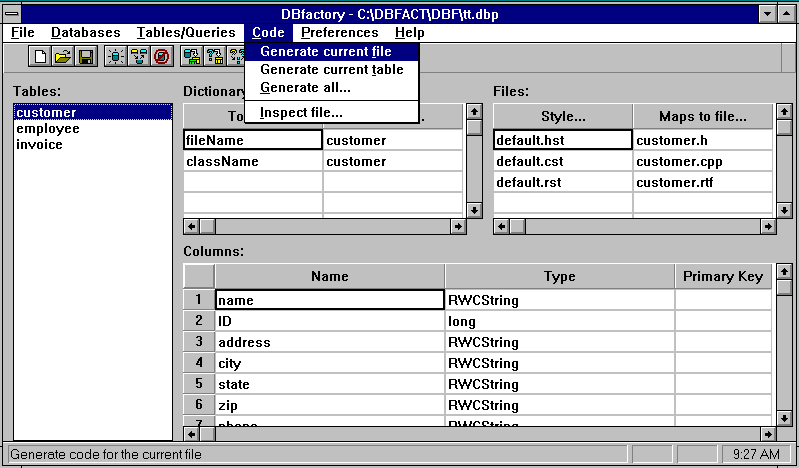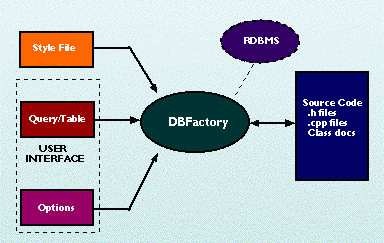
DBFactory
Supercharging Database Application Development
Rogue Wave Software
- Ease of Use
- DBFactory code generation is controlled through a windowing point-and-click interface. Database and schema information are
displayed on
your screen. You choose the elements you need to represent in your application, and DBFactory does the rest. Inputs include
a 'style file,'
and either a database query, user-defined criteria, or both. DBFactory creates three outputs: .h files, .cpp files, and
documentation for
generated classes.
- Efficiency
- The default style file creates DBTools.h++ code. Two classes, a data mapping class and a database interface class, are
generated to promote
"lean" classes that minimize memory usage. In addition, DBFactory automatically creates documentation for each class it
generates.
- Flexibility
- DBFactory uses 'style files' to control code generation, delivering unparalleled flexibility. You can edit the style file
to tailor output
to your specific needs.
- Extensibility
- DBFactory delivers maintainable, extensible code for your mission-critical applications. It also protects your code
investment. You can
modify generated code, then regenerate it to capture database changes without losing your modifications.
- No Policy Imposition
- DBFactory does not impose database policy. You choose how to implement transaction support, null value handling, and error
models to match
your own database environment.
- Productivity and Portability
- DBFactory gives you the power to easily generate portable, maintainable, extensible code designed around your database
application needs.
Working with Sybase, Oracle, Informix and ODBC compliant relational databases, DBFactory will maximize your productivity by
supercharging
your development. Let DBFactory do the work for you!
DBFactory supercharges DBTools.h++ by automatically creating business objects representing your relational database.
DBFactory is a
code generator for database applications that creates production quality C++ classes representing relational database schema
information,
stored procedure activation, and query results. When you use DBFactory to generate DBTools.h
User Interface

Source Code
#include <rw/db/db.h>
#include "mmdbibse.h"
...
//--Accessor Functions
inline RWCString name () const;
inline long ID () const;
inline RWCString address () const;
inline RWCString city () const;
inline RWCString state () const;
inline RWCString zip () const;
inline RWCString phone () const;
...
Class Documentation
customerDom - customerDBI
Class customerDom maps the customer table into a C++ class. It is the base class from which other customer specialized
classes derive.
The interface between the table customer and objects of the class customerDom is provided by customerDBI objects.
customerDBI objects publicly inherit from RWDBStatus, thus allowing you to use the DBTools.h++ error model.
The status is correctly set after each operation that touches the database.
Public Constructors - customerDom
customerDom ();
Constructs a non-initalized object....
...
Architecture

- Style File:
- Defines the code style to be generated with C++ and markup language.
- Query:
- An input that provides a result table from the database that carries schema information. This includes column names and
types that can
be mapped into C++ variables, data types, function names, etc.
- Options:
- Optional user-defined characteristics, such as the generated class names, and the definition of primary keys.
- RDBMS:
- Source for query schema information.
- Source Code:
- Output generated by DBFactory. Existing source code generated by DBFactory can also be used as input for DBFactory.
Classes generated
by DBFactory also generate their own documentation.
DBFactory is initially available for Windows NT.
DBFactory generates DBTools.h++ source code that runs on all Windows and Unix systems supported by
DBTools.h++
DBTools.h++ combines the fundamental data structures and utility classes found in Tools.h++ with intuitive database objects
such as DBTable and DBRow.
It provides native access to Oracle, Sybase, Informix, and Ingres, plus generic access to many more databases via ODBC.
DBTools.h++ is multithread safe, offers flexible error handling, and, most importantly, eliminates the discomfort of using a
procedural interface in your object-oriented applications.
Whether you're a novice or an expert in C++, using DBTools.h++ means you'll complete your projects more quickly and minimize
the time you spend on maintenance.
© Copyright 1995, Rogue Wave Software, Inc.


